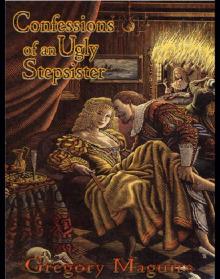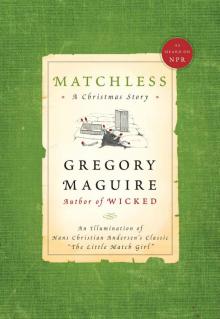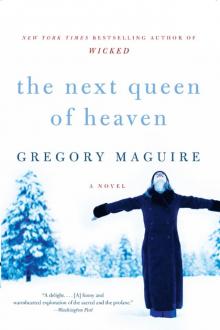- Home
- Gregory Maguire
The Next Queen of Heaven Page 2
The Next Queen of Heaven Read online
Page 2
But even that thought: a violation. She shuddered and wished she were the type to wear a Burberry scarf so she could clutch it now, but uh-unh. Not with the shoulders of a stevedore as her own mother, the redoubtable Ida Prelutski, used to point out. Honey, can’t you hunch a little and try to appear normal?
Open the door to worry, and look what happens: a junior assistant of Beelzebub tempts you to abhor your own firstborn child. Turn her into an embodiment of one of the deadly sins. Plainly put—or in words that would have been plain enough in Ida Prelutski’s mouth—a floozy. A strumpet. A tramp. A harlot. (Wasn’t there an eatery in that Syracuse mall called Harlots? What were they thinking?)
Harsh words, these, but thinking them as she navigated the stairs of a Catholic church only made her descent the more alarming, as Mrs. Scales didn’t hold with religion of the Roman variety.
She paused for a minute in the dark. Halfway down and halfway up.
The stairwell proved exceedingly dark. There’d be a switch at the bottom, surely? Her thoughts returned to Halloween coming tonight—your children will turn to beasts before your eyes, was that legitimate Biblical prophecy or was it a movie trailer voice-over? She was beset by beasts, the nameless kind. They had waited all her life to get her. All she’d ever wanted was to be free. But free, free of what? If you couldn’t name the beasts, see them, you couldn’t process your prayer request with any accuracy. Being a devoted study circlist has never helped me much, she thought.
She imagined marching to Tabitha and saying, “No more, young lady; out of my house. In the sight of God I can be shamed by my own flesh and blood no longer. Get out. And take that severed head of Nixon with you.” She knew Tabitha would only snort some lewd reply.
She drew herself together—this is what happened when you didn’t sleep all night out of worry. You went stark raving un-Christian. And she a middle-aged pillar of the Radical Radiant Pentecostals. (Also Republican, with some standards.) Take a good look at yourself, she remonstrated. Behind enemy lines, sneaking into the Catholic stronghold. During Mass. Of course, I’ll replace the milk.
At length she made it to the bottom of the stairs without twisting an ankle. She still couldn’t find the switch, but the refrigerator—a Kelvinator dating to the last days of the Eisenhower administration, by the look of it—would probably feature a twenty-watt bulb in the ceiling panel inside the door. It did. The light came on just in time for Mrs. Leontina Scales to see a semi-retired statue of Our Lady with a Chip on Her Shoulder perched up top. It shifted, with a faint sound of grit giving way, and glissaded off the pockmarked appliance.
It was a heavy statue. It bounced against Mrs. Scales’s skull and then smashed to the linoleum. She registered that the noise was substantial, even thunderous, but that was all.
3
UPSTAIRS, THE CHIEF of the collection basket brigade, Turk Schaeffer, heaved himself from his kneeling position, made a perfunctory genuflection, and trudged off to investigate. Father Mike sat in his chair, eyes closed in contemplation of austere mystery.
Nearing the end of the third chorus, the choir stumbled since the music director, Jeremy Carr, remained paused, his head cocked as if expecting further tympanic crashes. Should they wait for his cue? Or continue on as they’d rehearsed? Under the lead of the loudest soprano, Peggy Mueller, the choir charged into the fourth verse, reminding Jeremy of his obligations to his all-volunteer army of would-be soloists. His arm started wagging again.
Turk Schaeffer found Mrs. Leontina Scales out cold in a puddle of full cream milk. Shards of grayish porcelain were scattered around her. Turk, a retired lineman with Niagara Mohawk, had seen his share of accidents. He could tell that Mrs. Scales, whom he knew only to nod to when he ran into her at the Grand Union, wasn’t hurt bad. She was breathing. No blood pinked up the milk. But a lump the size of an eggroll pushed up through her thinning hair.
“Mercy, Turk, what’s up?” said Polly Osterhaus, an alto whom the choir director had sent downstairs, as backup. Altos were good in a crisis.
“I can take care of this,” said Turk.
“Is that Mrs. Scales from over on Papermill Road? What happened to her?”
“Our Lady took her out, looks like,” said Turk. “Polly, why’ncha go to the rectory and get the clinic to send someone over? And grab some ice from Father Mike’s icebox—this freezer has been out of commission since before Vatican II. And bring a towel.” He leaned and peered. “And if you see a quart of milk, better bring that too. There’s nothing left for coffee hour, especially now that there’s something for everyone to hang around and yak about.”
Polly Osterhaus felt Mrs. Scales’s wrist first. “Well, her pulse seems good. I guess she’s okay. You better not move her till the experts get here. Should I run across and interrupt the Radiantics at their seance? You think?”
“Not that serious, I’m guessing.”
Polly left. Turk mopped up the milk. When he took the woman’s head into his lap, the bump was growing a yellowy mauve-brown like an onion found at the back of the cabinet. His stomach lurched.
A taciturn man can be an observant man. Turk knew a few things about Leontina Scales, a few things he would rather not say. He didn’t want to wake up and find himself married to another Mrs. Turk Schaeffer anytime soon, though his first wife was dead these four years already. So with strictly charitable intentions he patted Leontina Scales’s forehead and the stiff, Brillo-paddy structure of her hair (reinforced by strategies enacted at Linda Pearl’s House of Beauty, no doubt; round this edge of Oswego County, women’s hair didn’t come by such an exoskeletal quality without the interventions of Linda Pearl). He hoped, for her sake, that Mrs. Scales would recover quickly enough so that no one would need to send for her daughter. A piece of work, that one. But the apple didn’t fall very far from the tree, in his humble opinion.
LEONTINA SCALES BLINKED herself awake thinking, at first, that she had gotten drunk and passed out. So it was alarming to find the music ministry of Our Lady Comfort of the Concussed standing in a semi-circle around her. At least they weren’t singing. Which was something of a blessing. As she emerged a bit further she realized that she couldn’t have blacked out in an alcoholic haze as she didn’t touch liquor any more.
She struggled to speak and couldn’t. She thought of her second husband, Wally, and how he would grab the end of his necktie with one hand, stretch it out taut like a razor strop, and slide his whiskey sours along the incline, a runway directly to his mouth. Leontina had admired his ingenuity and then she had left him, because she’d hated his taste in ties, and ingenuity wasn’t enough to sustain a marriage.
Due to Wally’s example, she’d sworn off alcohol. So she couldn’t be drunk. She had been attacked by a demon. Had something beneath the stairs gotten her? An eyeless Nixon? Or was this a stroke?
Jeremy Carr crouched down at her side and touched her hand. “Are you with us?” he said. For a minute Mrs. Scales thought the choir director meant was she joining his papist cowboy chorale. But perhaps he was being sympathetic in a sort of psychological way. Men are from Mars, women are from Venus, but Catholics are from another space-time continuum altogether. Mrs. Scales shook her head when she meant to nod, which confused herself as well as him.
“Don’t crowd the lady,” said Turk Schaeffer.
“The clinic’s sending an ambulance over,” said Polly Osterhaus.
“How’re we feeling, eh there?” Turk bobbed his head down into Leontina’s line of vision. Mrs. Scales was glad to see someone nearer her own generation hovering like an Old Testament patriarch or like Dan Conner on Roseanne. “You want we should call anyone? Tabitha? Hogan?”
“Oh,” said Mrs. Leontina Scales, though she meant to say No. “Oh, oh.” She sounded like a geriatric sequel to a kindergarten primer. Dick and Jane Lose Their Marbles. The Second Childhood of Dick and Jane. She nodded her head though she meant to shake it.
“Tabitha’s home, I guess?” asked Turk.
“Yes again,” sh
e said, and nodded, though once more she had meant to shake her head, and say Guess again. Turk disappeared from view. The choir filled in. Starting to remember what had happened, she closed her eyes.
In vestments Father Mike came billowing by. “Forgive us our trespassers,” he said. “It’s Leontina Scales, isn’t it? Well, the milk of human kindness isn’t a bad thing to take a morning bath in, Mrs. Scales. Don’t you worry, we’ll have you up and out of here and back across the way before you can say—”
“Go to hell,” said Leontina. Astounding herself as much as the others, she passed out again.
“Better call the family,” said Father Mike. “Turk, you up to it?”
As he hauled himself up the basement steps, Turk found himself wishing he wasn’t quite such a pillar of the church. The Scales family specialized in odd ducks as far as he was concerned. Small towns probably don’t have more lunatics per capita than cities do, thought Turk, they just show up easier. And around here gossip was both a sin and a competitive pastime, the way bridge had been to his parents’ generation.
Turk Schaeffer recalled some story about Tabitha Scales as a kid. Suggestible, as the young always are. At the age of seven she had spent three-quarters of a year with a clothespin on her nose, trying to keep witchcraft from winging itself through her nasal passages. That’s what comes of naming your kids after TV characters, thought Turk.
Tabitha was now, what? Seventeen? As far as Turk knew she spent more time dawdling at home waiting for someone to offer her a job than she did going to school. Turk knew about Tabitha because he played cards with Jack Reeves every other Tuesday and Jack—the town’s police chief, fire chief, and high school principal—had a habit of dishing the dirt after the third beer or so. Rumor had it that Tabitha was in and out of that police station so often that she had taken to decorating her own cell. Supposedly it was appointed with a Kurt Cobain poster and an old Aerosmith poster and a pink and black afghan that her mother had made.
Tabitha was too pretty for her own good. Anyone at all coming to town was of interest to her. Because Tabitha’s prettiness attracted trouble in the form of roadies with motorbikes throbbing between their legs.
She was slender, pouting, wide of eye and glazed of skin, skin with a puddingy sheen that suggested intelligence when all other evidence pointed to the contrary. She was crowned with an airy storm of pale chestnut hair. Men tended to lose their center of gravity for a minute when she passed by. Back when Tabitha was all of twelve, she was already pungent as eucalyptus.
The middle child, Turk Schaeffer remembered, was Hogan. Hogan Hero Scales. There was something wrong with him, having to do with small animals and microwaves. Oswego Electronics had put their collective foot down and refused to repair another appliance at the Scales home. Warranty or no.
Turk didn’t remember what the third kid was called. Probably Kermit or Fonzie or something.
THE DEVOUT OF Cliffs of Zion Radical Radiant began to worry when they’d filed out of Meeting for Consanguinity Hour only to discover that the Mister Coffees (regular and decaf) were still cold and empty. Mrs. Scales usually took her Coffee Ministry seriously. She was nowhere to be found. So Pastor Jakob Huyck himself went sniffing about the back door of Our Lady’s. “Jakob, we’ve landed one of yours,” Father Mike Sheehy said, seeing him there. “What’ll you give for her release?”
“Mike, she’s a secret agent. You found her out, you keep her.” But Pastor Huyck’s tone changed when he saw Leontina stretched out on the daybed that the Catholic maintenance man used for his afternoon naps. “Leontina, what’re you doing here?”
“Leaping a lot,” she said.
“Beg pardon?”
“Leaping every now and then. Can’t help it.” She closed her eyes and began to snore.
“Goodness,” said Pastor Huyck. “Now there’s a hidden charism.”
“Father Mike,” said Turk Schaeffer, “the Scales kids are here.”
“Have them come down.”
“Hope your insurance is paid up, Father Mike,” Pastor Huyck said.
“I’ll call the clinic again,” Polly Osterhaus said. “Where’s that ambulance?”
“I was supposed to have a meeting with you, Father Mike,” said Jeremy Carr, his arms full of sheet music.
“Can you chat with Sister Alice?” said Father Mike. He looked up the stairs.
Turk turned to see Tabitha Scales and the younger brother navigating through the coffee-and-doughnuts crowd. Kirk, he remembered now. Kirk had an airbrushed sort of anxiety about him, a pensive concern, almost saintly. The entire alto section and one of the tenors fell in love with him at once. Tabitha approached more reluctantly. Sheathed in shaggy mammoth-fur leggings over a tight-fitting leotard. Not quite Sunday school. “Our Lady in pieces on the ground?” said Tabitha Scales, glancing around. “I can’t believe it. Ma, what are you doing in a Catholic church basement? Field trip?”
“Aching and leaping, aching and leaping,” said Mrs. Scales, opening her eyes again.
“The leap of faith?” said Father Mike, though more from habit than humor.
He was feeling her forehead and she didn’t like it. “Ooh, fuck you,” she said.
“Not again with this language!” said Tabitha. “Are you possessed or what?”
“Am of God, who takes away the sins of the world,” replied her mother. “So you: shut up.”
4
HAD THE HOLY Spirit perfected its own Inner Breathing exercises and centered itself, using the Compass Rose method, right into the rectory of Our Lady’s, its private Eye of God might have taken in a pair of parish employees in conversation.
Sister Alice Coyne. Mid forties. Radiated concern which, while genuine, was also a symptom of mild deafness. She strained to apprehend.
Pleasant enough to look at, by consensus of anyone who spent time considering the physical loveliness of nuns, admittedly a small pool. Her clothes sensible without being industrial. The pearly-gray rayon blouses looked closer to silk than to starched linen.
She bustled into Father Mike’s study ahead of Jeremy Carr. “What a stir this morning. I’m off to Rochester shortly, Jeremy, but I’ll do what I can if this is urgent.”
“It isn’t, and it is, kind of.”
Jeremy Carr. Early thirties. Mess of brown hair, a bird’s nest worn upside down. Dropped into the late nineties by way of the early seventies but, Sister Alice ventured to herself, not so much timeless as clueless. So often he seems to be partly ten years old.
Self-effacing, he threaded his way about the rectory and the church in a camouflage of piety. He favored cheap flannel shirts from Gopal’s Army Navy Shop. Smears of robin’s egg blue, cream, cranberry, foul brown. Sister Alice could sometimes smell engine grease on Jeremy, but it probably came from some fixative used in preparing the fabric. She suspected that Jeremy wasn’t mechanically inclined.
“What’s up in Rochester?” asked Jeremy.
“Chapter meeting of the Southern Province.” Sister Alice didn’t know Jeremy all that well; she’d been working at Our Lady’s as a jack-of-all-trades only since the previous April and her purview didn’t include the music ministry. “The Southern Province of the Sisters of the Sorrowful Mysteries,” she continued, a touch more sharply. “We originated in France, but we’re predominantly Canadian. The Northern Province is Quebec and Ontario; the Southern Province, New York and Pennsylvania. We now call France the Eastern Province, though I think that’s affected us.”
“And the West?”
“We’re not in a position currently to open new markets.” Jeremy didn’t seem to realize she was joking. Sister Alice sighed. “Father Mike asked me to troubleshoot for him, Jeremy. He said you’d requested a meeting urgently—you’ve got some business matter on hand?”
She expected it might be a petty cash issue. Our Lady’s wasn’t exactly a tub on its own keel. Given that last year the parish had fallen 62 percent short of its assessment for the annual Bishop’s Development Fund contributions, in consci
ence Sister Alice couldn’t recommend an outlay for sheet music that the choir seemed incapable of putting to good use anyway. Father Mike, a softie, often used Sister Alice as a first line of defense against requests for funds. She set her jaw and smiled the company smile.
Jeremy shrugged. “Maybe this isn’t the right time?”
Oh, Lord, he’s not going to quit, thought Sister Alice. Out in the nowhere land between Syracuse and Watertown, music directors don’t grow on trees. Especially music directors who will work for next to nothing. Even as it was, had Old Lady Donegan not died two years ago and left her small portfolio expressly to the cause of Honoring God with Music, Jeremy would’ve had to be let go. (There’d been some strong feeling in the Parish Council that Old Lady Donegan had intended the loyal parishioners to Honor God with Music by firing Jeremy Carr, dismissing the choir, and installing a tape deck from Radio Shack instead.) “If you’re not sure, perhaps you need to think a bit more,” said Sister Alice in her consoling tone. “Entirely understandable. No hasty decisions. Talk to Father Mike. He’s good with the young.”
Jeremy raised an eyebrow. “I’m not that young.”
“Look, everyone loves the job you do, and nobody thinks it can be easy, not with Peggy Mueller and that vibrato she can bring down Canadian geese with. You do the Lord’s own work, Jeremy—”
“It’s not about the choir. I mean, not directly. Not really.”
“A fine job, quite a wonderful job—” Sister Alice took a few seconds to climb down from the heights of platitude. “Well anyway, no one could do better with what you’ve got to work with.”
Jeremy was laughing. “They’re not that bad. You should have heard us seven years ago when I started. It was as if Vatican II had never happened. They were still singing ‘Joy to the World’ every week for recessional, because that was the only thing old Miss Trembly could play using foot pedals, and it eased the pain in her insteps.”

 Missing Sisters
Missing Sisters Wicked: The Life and Times of the Wicked Witch of the West
Wicked: The Life and Times of the Wicked Witch of the West After Alice
After Alice Confessions of an Ugly Stepsister
Confessions of an Ugly Stepsister Son of a Witch
Son of a Witch Matchless
Matchless The Next Queen of Heaven
The Next Queen of Heaven Leaping Beauty: And Other Animal Fairy Tales
Leaping Beauty: And Other Animal Fairy Tales Hiddensee: A Tale of the Once and Future Nutcracker
Hiddensee: A Tale of the Once and Future Nutcracker A Wild Winter Swan
A Wild Winter Swan Egg & Spoon
Egg & Spoon Out of Oz
Out of Oz Leaping Beauty
Leaping Beauty Hiddensee
Hiddensee The Wicked Years Complete Collection
The Wicked Years Complete Collection The Next Queen of Heaven: A Novel
The Next Queen of Heaven: A Novel